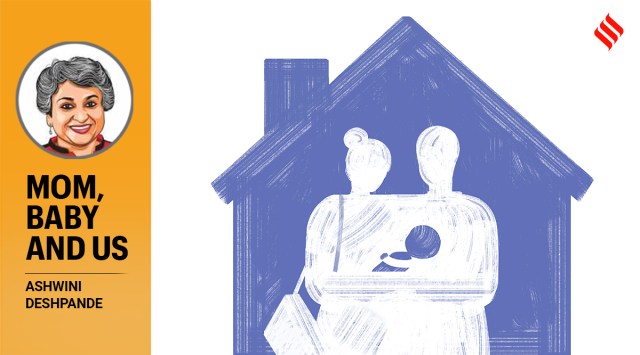- India
- International
Mom, baby and us: Who takes care of the children?
Supreme Court's upholding of constitutional rights of working mothers will only be realised by investing in care economy and emphasising that childcare is a social need
 Recently, a government employee in Himachal Pradesh was denied the CCL. The Supreme Court declared this denial as a violation of working women’s “constitutional right”. (Illustration by CR Sasikumar)
Recently, a government employee in Himachal Pradesh was denied the CCL. The Supreme Court declared this denial as a violation of working women’s “constitutional right”. (Illustration by CR Sasikumar)Which parent is primarily responsible for the hands-on work that goes into raising children until they are adults? In India, like elsewhere in the world, it is typically the mother. The central government has a childcare leave (CCL) policy which allows for 730 days of paid leave to female employees during their entire service period, for taking care of a maximum of two children under 18 years. This is over and above maternity leave.
The explicit mention of female employees as beneficiaries could be viewed as a valid recognition of the fact that it is primarily mothers who do the heavy lifting of raising children that extends beyond the first six months after birth (the period considered under maternity leave). Men are eligible for CCL only if they are single fathers.
While one can justify this gendered policy targeted towards mothers on pragmatic grounds — mothers are direct caregivers much more so than fathers are — we can legitimately ask if the law should be putting a seal of legitimacy on inequitable norms. This is a genuine conundrum because if the inequitable gendered norms are firmly entrenched, offering CCL to fathers might result in a situation where they avail of paid leave, but don’t actually contribute to the multitude of daily tasks that constitute childcare, including providing the emotional and logistical anchoring during stressful periods, like the board exams.
If women are the ones bearing this responsibility, over and above their multiple other contributions to the household, their workplace needs to recognise this and provide some accommodation for this extra work, which presumably is the intention behind the CCL. This is a central government provision that is not binding on the states. Recently, a government employee in Himachal Pradesh was denied the CCL. The Supreme Court declared this denial as a violation of working women’s “constitutional right”.
There are several questions that this episode raises which highlight the complications inherent in this policy. If this is a constitutional right, should this central provision not be binding on the states? And why is this provision applicable only to government employment, unlike maternity leave? Would making this mandatory in the private corporate sector worsen employer bias against women, i.e., would they be less likely to hire women? Finally, how many establishments have the bandwidth to implement this?

Let’s look at the last question first. Provisions of the Maternity Benefit Act, or the POSH (Prevention of Sexual Harassment) Act are applicable to establishments with 10 or more employees. We need to note that the overwhelming majority of firms in India are not covered by any of these benefits because they are too small. The Economic Census reveals that 98 per cent firms are “micro”, i.e., they have less than 10 employees.
Official data from the Unincorporated Enterprises Survey for 2015-16 reveals that the average number of people working in an enterprise is 1.78, i.e., less than two. 61.8 per cent of these enterprises have one worker; 35.6 per cent have 2-5 workers; 1.9 have 6-10 workers. Only 0.8 per cent of all unincorporated enterprises have more than 10 workers.
Even in the registered manufacturing sector covered by the Annual Survey of Industries (ASI), where one would expect individual firms to be large, data reveals that 30 percent of such establishments have less than 10 employees.
The ground reality is that the pro-women laws, which are meant to ensure constitutional rights, are applicable to a small minority of employed women. In the larger establishments (i.e., private establishments with more than 10 workers) where POSH and maternity laws are applicable, research hints at perverse consequences, such that in the short run, these have the potential to worsen employer bias against women.
This doesn’t mean that there should not be pro-women laws, even if applicable to a tiny proportion of workers. Wherever possible, legal structure needs to guarantee women’s rights. However, we also need to think more broadly about how to effectively ameliorate the burden of childcare that is seen as essentially the mothers’ responsibility. This would require several elements, of which the CCL could be one part, with the recognition that it is genuinely difficult for smaller establishments to implement.
The 3Rs framework shows the way forward: Recognise, reduce, and redistribute the responsibility of childcare. Today’s children are tomorrow’s workforce and therefore childcare is a social responsibility. We need to recognise that childcare consists of a set of multiple, complex, daily, repetitive, physical and emotional tasks that mothers perform, over and above all their myriad other daily tasks. Recognition will make the issue visible.
How can this load be reduced? Through redistribution, both within the household and outside. Within the household, the redistribution will occur through sharing among household members, most importantly by fathers pitching in, not as occasional babysitters, but by being a part of the daily journey. At the moment, sharing outside the household happens mainly through expensive private childcare, which very few can afford. Both in urban and rural areas, we need good quality, affordable, reliable and safe childcare in our neighbourhoods. This can be provided both by government and private players.
To sum up, we need to invest in the care economy. That is the only way the constitutional rights of mothers will be realised, which not only entitles them to respite from the individualised burden of childcare and enshrines the principle that childcare is a social need.
The writer is professor of economics and founder director, CEDA, Ashoka University. Views are personal
EXPRESS OPINION
More Explained
Jun 02: Latest News
- 01
- 02
- 03
- 04
- 05
































